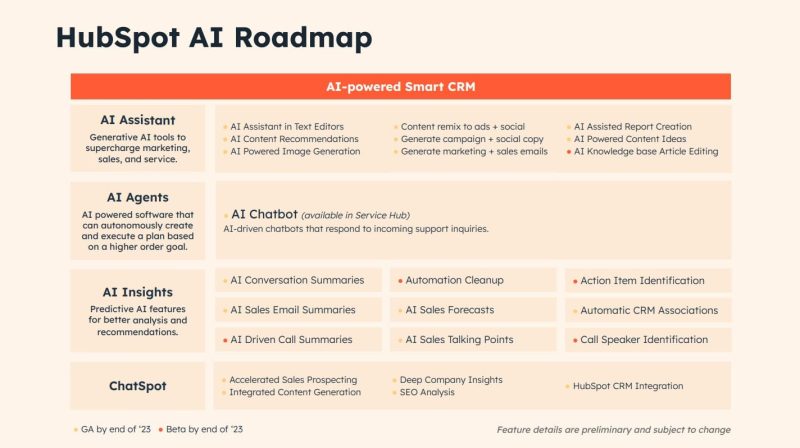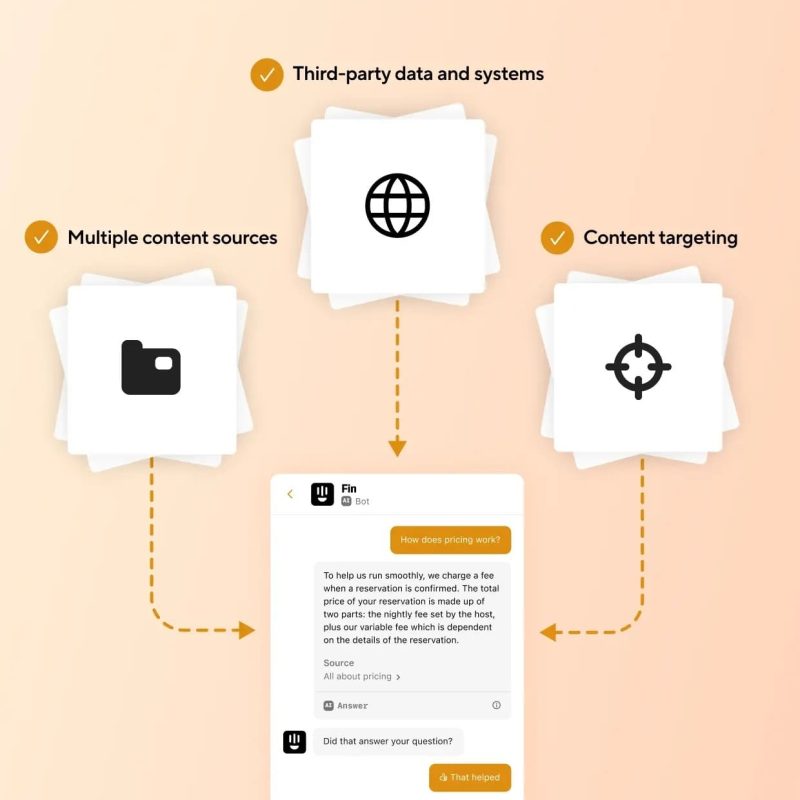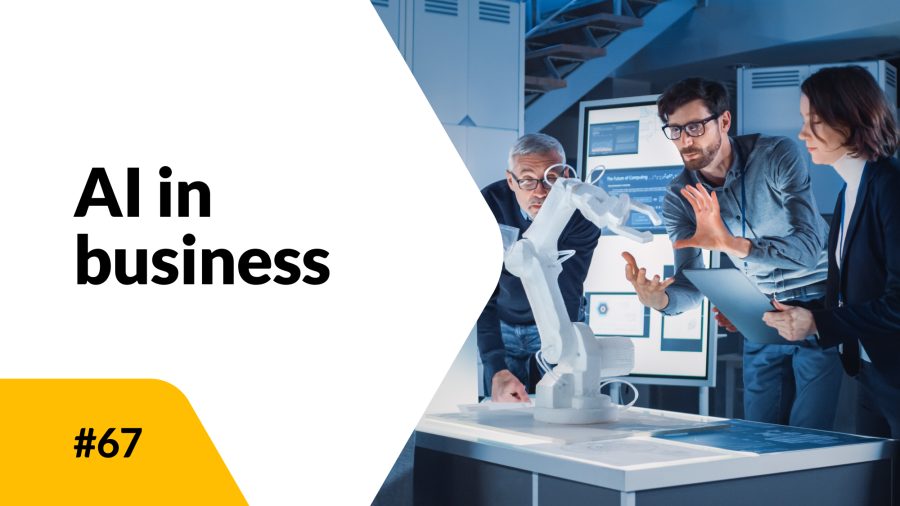AI in CRM - table of contents
- Introduction to AI in CRM
- How AI is changing the CRM landscape: An overview of possibilities
- Personalization of customer interactions through AI
- How AI improves segmentation and targeting in CRM
- Utilizing sentiment analysis in CRM with the help of AI
- Intelligent assistants and chatbots in CRM
- Summary
Introduction to AI in CRM
CRM, or Customer Relationship Management, is a system designed for managing customer relationships. It consists of three main components:
- Interactive CRM – ensures consistent and satisfying communication across all channels,
- Operational CRM – responsible for collecting, standardizing, and sharing data about customers and products. Properly utilized, it creates a knowledge base and builds lasting relationships,
- Analytical CRM – uses advanced analytical models, including AI, to process Big Data and uncover patterns in customer behaviors and market trends. This helps in making better business decisions.
Combined with new analytical capabilities, CRM systems allow personalized communication, customer support through chatbots, and automation of processes, leading to improved customer relationships and experiences.
How AI is changing the CRM landscape: An overview of possibilities
Leading CRM system providers integrate AI solutions that completely transform the way marketing, sales, and customer service departments work. The ways in which AI tools function in customer relationship management vary widely, so let’s take a closer look at three of them that most interestingly leverage the capabilities of artificial intelligence.
HubSpot CRM
HubSpot CRM is an all-in-one AI tool for managing customer relationships. It uses AI to improve marketing, sales, and customer service by quickly finding information and providing comprehensive content writing support.
It also offers tools for automating the creation of websites and newsletters, which is why HubSpot users appreciate the convenience, speed, and attractiveness of the generated content.
Key capabilities of HubSpot CRM related to AI include a website generator that automatically creates pages based on simple instructions and an AI Content Writer that generates content using AI, saving time.
Companies like Trello, Slack, and InVision use HubSpot CRM. Its main benefit is saving time through the automation of routine tasks.

Source: Hubspot (https://www.hubspot.com/)
Salesforce Einstein
Salesforce Einstein is based on advanced data analytics, AI-powered insights, sales recommendations, outcome predictions, and other features leveraging artificial intelligence.
Key capabilities of Salesforce Einstein include:
- advanced personalization – Einstein enables the creation and deployment of AI assistants directly in Salesforce, allowing users and customers to quickly solve problems and work more efficiently. Einstein Copilot is an AI assistant that automates tasks based on predefined skills, primarily aiming to increase productivity.
- Einstein Trust Layer – it ensures customer data security through AI architecture embedded in the Salesforce platform, allowing the use of AI without the risk of data breaches,
- open-source platform — Einstein allows secure usage of any large language model (LLM), such as OpenAI’s GPT-4, Google’s GeminiPro, or models available under open-source licenses like Llama-2 or Vicuna-13B.
Companies like Uber Eats, Gucci, and Accenture use Salesforce Einstein. This solution enables them to quickly resolve customer issues and work more efficiently.
Intercom Fin
Intercom Fin is a chatbot based on OpenAI language models that understands customer queries and provides answers based on technical support content.Intercom Fin, as an AI tool in customer relationship management, allows for:
- reducing customer support inquiries by 60%—thanks to the ability to utilize product knowledge base and advanced language models,
- conducting conversations in 43 languages,
- operating on multiple channels—via the well-known Intercom messenger, as well as WhatsApp and even SMS.
Intercom Fin helped companies like MailerLite increase the percentage of automatically resolved queries from 18% to 29% within a week.

Source: Intercom (https://www.intercom.com/fin)
Personalization of customer interactions through AI
CRM systems gather data about customers and their behaviors. With AI in customer relationship management, data is automatically analyzed to provide personalized communication. This includes:
- personalized recommendations – based on purchase history, interests, demographic data, and other parameters, enabling effective cross-selling and upselling,
- dynamic content on websites – AI in customer relationship management means targeted, personalized content based on user data,
- personalized newsletters – unique, tailored content for each recipient.
- better-targeted ads – displayed to people they truly resonate with.
An example of a company utilizing personalization capabilities in CRM is IKEA. According to a Capgemini report, the Swedish giant employs advanced AI models for customizing newsletters. The system analyzes customer data to tailor content and offers to their needs and interests.
Personalized experiences build trust and enhance customer satisfaction. According to McKinsey, as many as 78% of customers state that they would buy products again from brands that provide personalized experiences. Moreover, a 2022 Twilio study (State of Personalization Report) indicates that a significant 62% of customers would switch goods or services providers if the content was not personalized.
How AI improves segmentation and targeting in CRM
Customer segmentation and precise targeting are the foundations of modern marketing. Artificial intelligence enables significant progress in this area through features such as:
- automatic customer segmentation – grouping based on behavioral, transactional, demographic, and other data,
- machine learning to identify the most valuable customers – big data and predictive analysis help define a group of customers worth special attention,
- real-time analysis of customer sentiments and intentions – with these AI elements in customer relationship management, you’ll discover what your customers think and plan,
- predictive models that determine the likelihood of purchase and churn, and can also suggest additional products that perfectly match the customer profile.
For example, Allegro, the largest e-commerce platform in Poland, uses advanced AI models to segment customers. According to Interaktywnie.com, thanks to machine learning algorithms, Allegro is able to determine customers’ shopping preferences with up to 90% accuracy and target them with personalized offers.
Utilizing sentiment analysis in CRM with the help of AI
Sentiment analysis involves automatically assessing the attitude of a speaker or text author. Natural Language Processing (NLP) models classify opinions as positive, negative, or neutral. Enabled by AI, sentiment analysis allows for:
Evaluating customer satisfaction during conversations—determining if customers are content and assessing service quality.
- monitoring social media and discussion forums.
- tracking product reviews—identifying flaws and issues.
- analyzing customer needs based on phone call transcriptions.
- promptly detecting negative signals from customers and enabling quick responses.
Sentiment analysis is a powerful AI tool in customer relationship management, helping build positive customer relations. Global giants like Amazon and Netflix also employ similar solutions.

Source: DALL·E 3, prompt: Marta M. Kania (https://www.linkedin.com/in/martamatyldakania/)
Intelligent assistants and chatbots in CRM
Chatbots, like Intercom Fin, supporting customer service, are slowly becoming a standard. Implementing them brings many benefits, for example:
- answering customer questions 24/7 via chat, email, or WhatsApp,
- automating simple tasks, complaint requests, or customer orders,
- redirecting to a consultant and smoothly taking over the conversation when the chatbot can’t handle the issue,
- detecting negative customer emotions based on vocabulary or tone of voice and responding appropriately,
- collecting feedback and conducting satisfaction surveys.
Companies investing in chatbots achieve tangible benefits – according to the Juniper Research report, it’s possible to reduce customer service costs by up to 90%. Furthermore, studies indicate that implementing a chatbot can reduce the number of inquiries directed to customer service by up to 40%. This translates into significant savings for the company.
AI in CRM – summary
The technological revolution driven by artificial intelligence and big data processing is changing how we approach building customer relationships. Modern CRM systems not only automate tasks but also help understand customer needs better. This allows for personalized offers and communication, leading to more lasting relationships and satisfying customer experiences, ultimately contributing to business success.
New technologies are here, and their impact is measurable. Estimates suggest a potential 25% increase in sales through personalized approaches (McKinsey). Using these capabilities is essential today to gain a competitive edge in a data-rich and technologically limitless world.

If you like our content, join our busy bees community on Facebook, Twitter, LinkedIn, Instagram, YouTube, Pinterest, TikTok.
Author: Robert Whitney
JavaScript expert and instructor who coaches IT departments. His main goal is to up-level team productivity by teaching others how to effectively cooperate while coding.
AI in business:
- Threats and opportunities of AI in business (part 1)
- Threats and opportunities of AI in business (part 2)
- AI applications in business - overview
- AI-assisted text chatbots
- Business NLP today and tomorrow
- The role of AI in business decision-making
- Scheduling social media posts. How can AI help?
- Automated social media posts
- New services and products operating with AI
- What are the weaknesses of my business idea? A brainstorming session with ChatGPT
- Using ChatGPT in business
- Synthetic actors. Top 3 AI video generators
- 3 useful AI graphic design tools. Generative AI in business
- 3 awesome AI writers you must try out today
- Exploring the power of AI in music creation
- Navigating new business opportunities with ChatGPT-4
- AI tools for the manager
- 6 awesome ChatGTP plugins that will make your life easier
- 3 grafików AI. Generatywna sztuczna inteligencja dla biznesu
- What is the future of AI according to McKinsey Global Institute?
- Artificial intelligence in business - Introduction
- What is NLP, or natural language processing in business
- Automatic document processing
- Google Translate vs DeepL. 5 applications of machine translation for business
- The operation and business applications of voicebots
- Virtual assistant technology, or how to talk to AI?
- What is Business Intelligence?
- Will artificial intelligence replace business analysts?
- How can artificial intelligence help with BPM?
- AI and social media – what do they say about us?
- Artificial intelligence in content management
- Creative AI of today and tomorrow
- Multimodal AI and its applications in business
- New interactions. How is AI changing the way we operate devices?
- RPA and APIs in a digital company
- The future job market and upcoming professions
- AI in EdTech. 3 examples of companies that used the potential of artificial intelligence
- Artificial intelligence and the environment. 3 AI solutions to help you build a sustainable business
- AI content detectors. Are they worth it?
- ChatGPT vs Bard vs Bing. Which AI chatbot is leading the race?
- Is chatbot AI a competitor to Google search?
- Effective ChatGPT Prompts for HR and Recruitment
- Prompt engineering. What does a prompt engineer do?
- AI Mockup generator. Top 4 tools
- AI and what else? Top technology trends for business in 2024
- AI and business ethics. Why you should invest in ethical solutions
- Meta AI. What should you know about Facebook and Instagram's AI-supported features?
- AI regulation. What do you need to know as an entrepreneur?
- 5 new uses of AI in business
- AI products and projects - how are they different from others?
- AI-assisted process automation. Where to start?
- How do you match an AI solution to a business problem?
- AI as an expert on your team
- AI team vs. division of roles
- How to choose a career field in AI?
- Is it always worth it to add artificial intelligence to the product development process?
- AI in HR: How recruitment automation affects HR and team development
- 6 most interesting AI tools in 2023
- 6 biggest business mishaps caused by AI
- What is the company's AI maturity analysis?
- AI for B2B personalization
- ChatGPT use cases. 18 examples of how to improve your business with ChatGPT in 2024
- Microlearning. A quick way to get new skills
- The most interesting AI implementations in companies in 2024
- What do artificial intelligence specialists do?
- What challenges does the AI project bring?
- Top 8 AI tools for business in 2024
- AI in CRM. What does AI change in CRM tools?
- The UE AI Act. How does Europe regulate the use of artificial intelligence
- Sora. How will realistic videos from OpenAI change business?
- Top 7 AI website builders
- No-code tools and AI innovations
- How much does using AI increase the productivity of your team?
- How to use ChatGTP for market research?
- How to broaden the reach of your AI marketing campaign?
- "We are all developers". How can citizen developers help your company?
- AI in transportation and logistics
- What business pain points can AI fix?
- Artificial intelligence in the media
- AI in banking and finance. Stripe, Monzo, and Grab
- AI in the travel industry
- How AI is fostering the birth of new technologies
- The revolution of AI in social media
- AI in e-commerce. Overview of global leaders
- Top 4 AI image creation tools
- Top 5 AI tools for data analysis
- AI strategy in your company - how to build it?
- Best AI courses – 6 awesome recommendations
- Optimizing social media listening with AI tools
- IoT + AI, or how to reduce energy costs in a company
- AI in logistics. 5 best tools
- GPT Store – an overview of the most interesting GPTs for business
- LLM, GPT, RAG... What do AI acronyms mean?
- AI robots – the future or present of business?
- What is the cost of implementing AI in a company?
- How can AI help in a freelancer’s career?
- Automating work and increasing productivity. A guide to AI for freelancers
- AI for startups – best tools
- Building a website with AI
- OpenAI, Midjourney, Anthropic, Hugging Face. Who is who in the world of AI?
- Eleven Labs and what else? The most promising AI startups
- Synthetic data and its importance for the development of your business
- Top AI search engines. Where to look for AI tools?
- Video AI. The latest AI video generators
- AI for managers. How AI can make your job easier
- What’s new in Google Gemini? Everything you need to know
- AI in Poland. Companies, meetings, and conferences
- AI calendar. How to optimize your time in a company?
- AI and the future of work. How to prepare your business for change?
- AI voice cloning for business. How to create personalized voice messages with AI?
- Fact-checking and AI hallucinations
- AI in recruitment – developing recruitment materials step-by-step
- Midjourney v6. Innovations in AI image generation
- AI in SMEs. How can SMEs compete with giants using AI?
- How is AI changing influencer marketing?
- Is AI really a threat to developers? Devin and Microsoft AutoDev
- AI chatbots for e-commerce. Case studies
- Best AI chatbots for ecommerce. Platforms
- How to stay on top of what's going on in the AI world?
- Taming AI. How to take the first steps to apply AI in your business?
- Perplexity, Bing Copilot, or You.com? Comparing AI search engines
- ReALM. A groundbreaking language model from Apple?
- AI experts in Poland
- Google Genie — a generative AI model that creates fully interactive worlds from images
- Automation or augmentation? Two approaches to AI in a company
- LLMOps, or how to effectively manage language models in an organization
- AI video generation. New horizons in video content production for businesses
- Best AI transcription tools. How to transform long recordings into concise summaries?
- Sentiment analysis with AI. How does it help drive change in business?
- The role of AI in content moderation


















